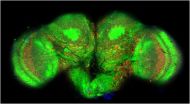MOFFETT FIELD, CA, February 27, 2014 (Press-News.org) Smart devices - such as tablets and phones - increasingly are an essential part of everyday life on Earth. The same can be said for life off-planet aboard the International Space Station. From astronaut tweets to Google+ Hangouts, our reliance on these mobile and social technologies means equipment and software upgrades are an everyday occurrence - like buying a new pair of shoes to replace a pair of well-worn ones.
That's why the Intelligent Robotics Group at NASA's Ames Research Center in Moffett Field, Calif., with funding from the Technology Demonstration Missions Program in the Space Technology Mission Directorate, is working to upgrade the smartphones currently equipped on a trio of volleyball-sized free-flying satellites on the space station called Synchronized Position Hold, Engage, Reorient, Experimental Satellites (SPHERES). In 2011 on the final flight of space shuttle Atlantis, NASA sent the first smartphone to the station and mounted it to SPHERES.
Each SPHERE satellite is self-contained with power, propulsion, computing and navigation equipment as well as expansion ports for additional sensors and appendages, such as cameras and wireless power transfer systems. This is where the SPHERES' smartphone upgrades are attached.
By connecting a smartphone, the SPHERES become Smart SPHERES. They now are more intelligent because they have built-in cameras to take pictures and video, sensors to help conduct inspections, powerful computing units to make calculations and Wi-Fi connections to transfer data in real time to the computers aboard the space station and at mission control.
"With this latest upgrade, we believe the Smart SPHERES will be a step closer to becoming a 'mobile assistant' for the astronauts," said DW Wheeler, lead engineer with SGT Inc. in the Intelligent Robotics Group at Ames. "This ability for Smart SPHERES to independently perform inventory and environmental surveys on the space station can free up time for astronauts and mission control to perform science experiments and other work."
Later this year, NASA will launch a Project Tango prototype Android smartphone developed by Google's Advanced Technology and Projects division of Mountain View, Calif. The prototype phone includes an integrated custom 3-D sensor, which means the device is capable of tracking its own position and orientation in real time as well as generating a full 3-D model of the environment.
"The Project Tango prototype incorporates a particularly important feature for the Smart SPHERES - a 3-D sensor," said Terry Fong, director of the Intelligent Robotics Group at Ames. "This allows the satellites to do a better job of flying around on the space station and understanding where exactly they are."
Later this month, Ames engineers will fly the prototype phone several times aboard an airplane that is capable of simulating microgravity by performing a parabolic flight path. The team has modified the motion-tracking and positioning code developed by Google that tells the phone where it is to work in the microgravity conditions of the space station. To verify that the phone will work, they must take the phone out of the lab at Ames and test it in a microgravity environment.
The SPHERES facility aboard the space station provides affordable opportunities to test a wide range of hardware and software. It acts as a free-flying platform that can accommodate various mounting features and mechanisms in order to test and examine the physical or mechanical properties of materials in microgravity. SPHERES also provides a test bed for space applications including physical sciences investigations, free-flying spatial analyses, multi-body formation flying and various multi-spacecraft control algorithm verifications and analyses. SPHERES also is used for the annual Zero Robotics student software programming competition. Ames operates and maintains the SPHERES facility, which is funded by the Human Exploration and Operations Mission Directorate at NASA Headquarters in Washington.
To date, astronauts have conducted 77 investigations using SPHERES to test techniques to advance automated dockings, satellite servicing, spacecraft assembly and emergency repairs. Now researchers are preparing to control the SPHERES in real time from ground control stations on Earth and from space.
In the long run, free-flying robots like SPHERES could also be used to inspect the exterior of the space station or future deep space vehicles. Robots like the smartphone-enhanced SPHERES and NASA's Robonaut 2, will provide some of the help of another crew member; SPHERES' cameras can act as another set of eyes, while Robonaut 2 literally adds another set of hands to act as an assistant with small and bulky items alike. An added bonus is that robots do not require any additional life support.
As with Robonaut 2, all tests to date have occurred in the safety of the space station's interior. However, in the future, upgraded SPHERES may venture outside the orbiting outpost.
"This is no ordinary upgrade - we've customized cutting-edge commercial technologies to help us answer questions like: How can robots help humans live and work in space? What will happen when humans explore other worlds with robots by their side? Can we make this happen sooner, rather than later?" said Fong. "Building on our experience in controlling robots on the space station, one day we'll be able to apply what we've learned and have humans and robots working together everywhere from Earth's orbit, to the moon, asteroids and Mars."
Rachel Hoover
Ames Research Center, Moffett Field, Calif.
Smart SPHERES Are About to Get A Whole Lot Smarter
The Intelligent Robotics Group at NASA's Ames Research Center is working to upgrade the smartphones currently equipped on a trio of volleyball-sized free-flying satellites on the space station.
2014-02-27
ELSE PRESS RELEASES FROM THIS DATE:
Pulling problem teeth before heart surgery to prevent infection may be catch-22
2014-02-27
Rochester, Minn. — Feb. 27, 2014 — To pull or not to pull? That is a common question when patients have the potentially dangerous combination of abscessed or infected teeth and the need for heart surgery. In such cases, problem teeth often are removed before surgery, to reduce the risk of infections including endocarditis, an infection of the inner lining of the heart that can prove deadly. But Mayo Clinic research suggests it may not be as simple as pulling teeth: The study found that roughly 1 in 10 heart surgery patients who had troublesome teeth extracted before ...
Childhood adversity launches lifelong relationship and health disadvantage for black men
2014-02-27
WASHINGTON, DC, February 24, 2014 — Greater childhood adversity helps to explain why black men are less healthy than white men, and some of this effect appears to operate through childhood adversity's enduring influence on the relationships black men have as adults, according to a new study in the March issue of the Journal of Health and Social Behavior.
"Our findings suggest that childhood adversity launches a lifelong process of relationship and health disadvantage for black men," said lead author Debra Umberson, a professor of sociology and a faculty associate in ...
Despite recession, children's health spending increased between 2009-2012, says new report
2014-02-27
Washington, DC – Spending on health care for children covered by employer-sponsored insurance (ESI) increased between 2009 and 2012, rising an average 5.5 percent a year, with more dollars spent on boys than girls, and higher spending on infants and toddlers (ages 0-3) than any other children's age group, finds a new report released today by the Health Care Cost Institute (HCCI). Per capita spending on children reached $2,437 in 2012, a $363 increase from 2009. The study shows a growth in prescription use by children through age 18, as well as a rise in the number of teens ...
Simple lab-based change may help reduce unnecessary antibiotic therapy, improve care
2014-02-27
[EMBARGOED UNTIL THURSDAY, FEB. 27] A simple change in how the hospital laboratory reports test results may help improve antibiotic prescribing practices and patient safety, according to a pilot, proof-of-concept study published in Clinical Infectious Diseases and now available online. No longer routinely reporting positive urine culture results for inpatients at low risk for urinary tract infections (UTIs) greatly reduced unnecessary antibiotic prescriptions and did not affect the treatment of patients who did need antibiotics, the study authors found.
Urine cultures ...
One in 5 US hospitals don't put hand sanitizer everywhere needed to prevent infections
2014-02-27
(NEW YORK, NY, February 27, 2014) – Approximately one in five U.S. health facilities don't make alcohol-based hand sanitizer available at every point of care, missing a critical opportunity to prevent health care-associated infections, according to new research from Columbia University School of Nursing and the World Health Organization (WHO) published in the American Journal of Infection Control. The study, which examined compliance with WHO hand hygiene guidelines in the U.S., also found that only about half of the hospitals, ambulatory care, and long-term care facilities ...
Scientists wake up to causes of sleep disruption in Alzheimer's disease
2014-02-27
Being awake at night and dozing during the day can be a distressing early symptom of Alzheimer's disease, but how the disease disrupts our biological clocks to cause these symptoms has remained elusive.
Now, scientists from Cambridge have discovered that in fruit flies with Alzheimer's the biological clock is still ticking but has become uncoupled from the sleep-wake cycle it usually regulates. The findings – published in Disease Models & Mechanisms – could help develop more effective ways to improve sleep patterns in people with the disease.
People with Alzheimer's ...
Over 80s often over-treated for stroke prevention
2014-02-27
People in their 80s are often prescribed drugs to ward off a stroke when the risk of a stroke is not that high and the drugs have other side effects, finds a perspective published online in Evidence Based Medicine.
People in this age group are being "over-treated," and doctors need to actively rethink their priorities and beliefs about stroke prevention, argues Dr Kit Byatt of the Department of Geriatric Medicine, The County Hospital in Hereford, UK.
Statins and antihypertensive drugs were the most commonly prescribed cardiovascular drugs in the UK in 2006. And they ...
Mental health of most UK troops serving in Afghanistan and Iraq is 'resilient'
2014-02-27
Despite prolonged combat missions to Iraq and Afghanistan, there has been no overall increase in mental health problems among UK soldiers, finds a review of the available evidence, published online in the Journal of the Royal Army Medical Corps.
But certain groups of soldiers do seem to be more vulnerable to mental ill health on their return home, while alcohol problems continue to give cause for concern among regulars, say the researchers from King's College London.
They retrieved published research looking at the psychological impact of deployment to Iraq and Afghanistan ...
Passive smoking linked to increased miscarriage, stillbirth, and ectopic pregnancy risk
2014-02-27
Passive smoking is linked to a significantly increased risk of miscarriage, stillbirth and ectopic pregnancy, finds a large observational study, published online in Tobacco Control.
The risk appears to be cumulative, with risk heightened in parallel with the length of time exposed to second hand smoke, the findings indicate.
It is well known that smoking during pregnancy significantly increases the risks of miscarriage and birth complications. What is less clear is whether passive smoking exerts similar effects, and if there are particularly critical periods of exposure ...
Spotted seal study reveals sensitive hearing in air and water
2014-02-27
Two spotted seals orphaned as pups in the Arctic are now thriving at UC Santa Cruz's Long Marine Laboratory, giving scientists a rare opportunity to learn about how these seals perceive their environment. In a comprehensive study of the hearing abilities of spotted seals, UCSC researchers found that the seals have remarkably sensitive hearing in both air and water.
The findings, published February 26 in the Journal of Experimental Biology, are important for understanding how spotted seals might be affected by noise from human activities in the rapidly changing Arctic ...
LAST 30 PRESS RELEASES:
Scientists reveal our best- and worst-case scenarios for a warming Antarctica
Cleaner fish show intelligence typical of mammals
AABNet and partners launch landmark guide on the conservation of African livestock genetic resources and sustainable breeding strategies
Produce hydrogen and oxygen simultaneously from a single atom! Achieve carbon neutrality with an 'All-in-one' single-atom water electrolysis catalyst
Sleep loss linked to higher atrial fibrillation risk in working-age adults
Visible light-driven deracemization of α-aryl ketones synergistically catalyzed by thiophenols and chiral phosphoric acid
Most AI bots lack basic safety disclosures, study finds
How competitive gaming on discord fosters social connections
CU Anschutz School of Medicine receives best ranking in NIH funding in 20 years
Mayo Clinic opens patient information office in Cayman Islands
Phonon lasers unlock ultrabroadband acoustic frequency combs
Babies with an increased likelihood of autism may struggle to settle into deep, restorative sleep, according to a new study from the University of East Anglia.
National Reactor Innovation Center opens Molten Salt Thermophysical Examination Capability at INL
International Progressive MS Alliance awards €6.9 million to three studies researching therapies to address common symptoms of progressive MS
Can your soil’s color predict its health?
Biochar nanomaterials could transform medicine, energy, and climate solutions
Turning waste into power: scientists convert discarded phone batteries and industrial lignin into high-performance sodium battery materials
PhD student maps mysterious upper atmosphere of Uranus for the first time
Idaho National Laboratory to accelerate nuclear energy deployment with NVIDIA AI through the Genesis Mission
Blood test could help guide treatment decisions in germ cell tumors
New ‘scimitar-crested’ Spinosaurus species discovered in the central Sahara
“Cyborg” pancreatic organoids can monitor the maturation of islet cells
Technique to extract concepts from AI models can help steer and monitor model outputs
Study clarifies the cancer genome in domestic cats
Crested Spinosaurus fossil was aquatic, but lived 1,000 kilometers from the Tethys Sea
MULTI-evolve: Rapid evolution of complex multi-mutant proteins
A new method to steer AI output uncovers vulnerabilities and potential improvements
Why some objects in space look like snowmen
Flickering glacial climate may have shaped early human evolution
First AHA/ACC acute pulmonary embolism guideline: prompt diagnosis and treatment are key
[Press-News.org] Smart SPHERES Are About to Get A Whole Lot SmarterThe Intelligent Robotics Group at NASA's Ames Research Center is working to upgrade the smartphones currently equipped on a trio of volleyball-sized free-flying satellites on the space station.



